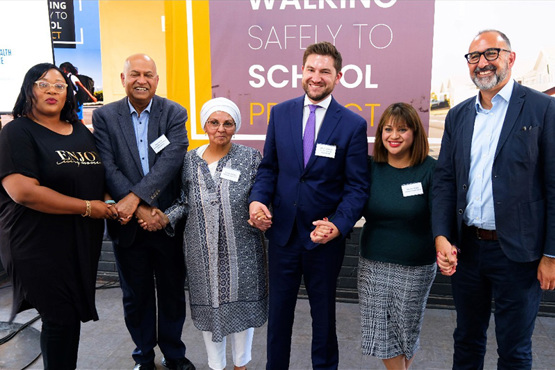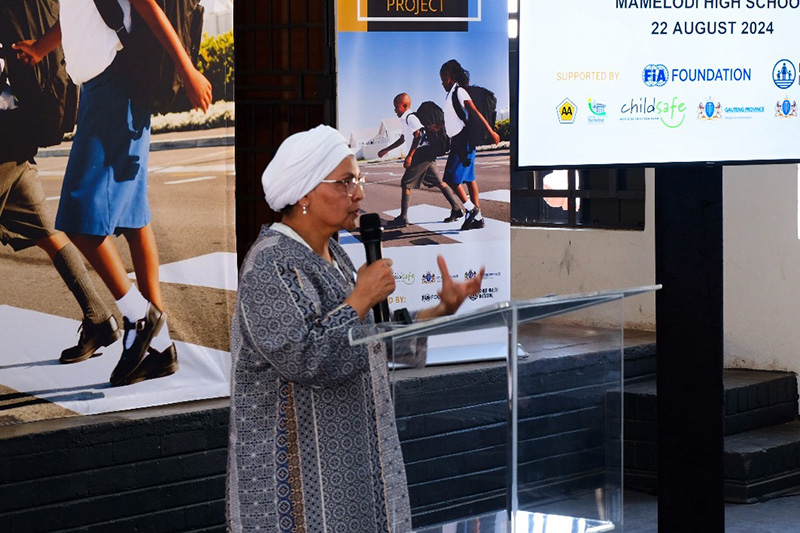Walking Safely To School project launched in South Africa

A new school zone safety pilot project, Walking Safely to School (WATCH), has been launched in Tshwane, South Africa, by the South Africa Automobile Association and ChildSafe South Africa, supported by the FIA Foundation.
Children make up more than one in 10 South African road deaths, and every day, more than 10 million school children across the country make the journey to and from school by foot. Factors that contribute to increased risk on these journeys include inadequate road infrastructure, a lack of supervision, and the fact that for the majority of children walking is their primary means of transport.
The WATCH project aims to improve road infrastructure and promote road safety around ten schools in Mamelodi, a township north of Pretoria. These include modifications to physical and passive traffic measures such as road safety traffic signs, traffic markings, speed humps, raised pedestrian crossings, and sidewalks around the school zones.
The project is part of a wider initiative to implement similar modifications at other schools across South Africa over time, which will include extensive lobbying by ChildSafe SA and AA South Africa to reduce speed limits at school zones throughout South Africa from the current 40km/h to 30km/h. The project is supported and endorsed by the City of Tshwane, Gauteng Department of Education, and the Gauteng Department of Community Safety.
In support of the project, the City of Tshwane conducted School Zone Road Safety Assessments at the ten selected schools in the Mamelodi region of the City. The recommendations from the audit informed the environmental modifications that will be implemented in each school. The ten schools selected are: Dr I.M Monare Primary School; Bohlabatsatsi Primary School; Pula Difate Primary School; Meetse-A-Bophelo Primary School; Mahube Valley Primary School; Ramahlale Primary School; Tsako-Thabo Secondary School; Zamintuthuko Primary School; Bula-Dikgoro Primary School, and Mamelodi High School.

The project is an expansion of earlier projects, including a Ford Foundation-funded project in Mamelodi, an FIA Foundation-funded project in Khayelitsha in Cape Town, and an FIA Foundation-funded project implemented with UNICEF support in Delft and Belhar, also in Cape Town.
ChildSafe Executive Director and Spokesperson Zaitoon Rabaney, said: “We continue to advocate for the 30km/h speed restriction around schools as well as environmental modifications that influence driver behaviour to adhere to slower speeds in school areas. Equipping our children and their families with the necessary knowledge and skills to navigate roads safely is paramount. Through educational programs, campaigns, and targeted outreach efforts, we can foster a lasting positive impact on the safety culture on our roads, especially around schools, focused on protecting our most vulnerable road users – children. Research shows that a pedestrian struck by a motor vehicle travelling by between 50km/h and 70km/h has a more than 80% chance of being killed. Survivors are often subject to serious injuries that result in physical and mental disability, often due to traumatic head injuries.”

Following the launch event, held at Mamelodi High School on 22 August, with participation by the Executive Mayor of Tshwane, Cilliers Brink, The WATCH project in Mamelodi will be implemented over the next two years, from April 2024 to March 2026, to allow for the rollout of the engineering modifications. During this time, ChildSafe will conduct a star-rating assessment of the schools and provide road safety education.The initiative will ensure that communities, parents, and schools will have enough capacity to alleviate road fatalities and injuries in children.
Saul Billingsley, Executive Director of the FIA Foundation said, “The WATCH project showcases the importance of partnership across public, private, and civil organisations to address the leading global cause of child injury deaths, road traffic crashes. These infrastructure assessments and improvements focus on separating children from traffic and slowing road speeds. Every child deserves an education and to arrive at school safely.”
Frank Lambert, Chief Engineer, Roads And Transport Department, Transportation Planning at the City of Tshwane, added: “The City of Tshwane welcomes the collaboration with ChildSafe South Africa and the introduction of traffic calming measures as well as environmental modifications around schools in Mamelodi. These interventions support the City in advancing and achieving its objectives towards creating safer schools with specific focus on road safety and securing the safety of scholar pedestrians.”
Sikkie Kajee, Chairman of the AA South Africa, concluded: “This is an important initiative that will ensure improved pedestrian safety for learners at the ten schools. Importantly, the collaboration of all the role-players is an example of what can be achieved when everyone pulls in the same direction for the benefit of learners and road safety. We are excited about the outcomes of the WATCH project and would like to see it replicated throughout the country. That will be our goal after this project is finalised.”



